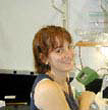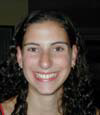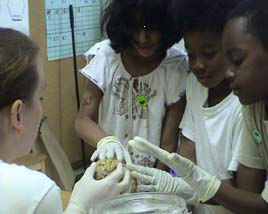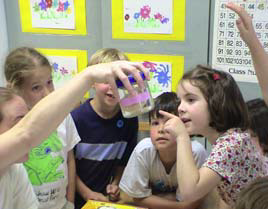Originally published December 2007.
Why am I writing about teaching science?
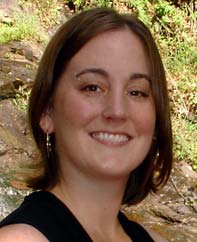 I am a recent graduate from the NS program, and I have had some experience balancing teaching activities with my other responsibilities as a graduate student (a list of some opportunities is at the end of this article). I was in the first cohort of PRISM graduate fellows back in 2003, I co-taught a freshman seminar class in 2005 as part of a HHMI Curriculum Development Fellowship, and I was the first SIRE graduate fellow in the Natural Sciences during the 2005-06 school year. I am not the only one of us who has successfully balanced these interests, but now that I have a fantastic postdoc in the Center for Science Education, it is sort of part of my job to help you consider your training as an educator and help you find the advice you need to get the training you want.
I am a recent graduate from the NS program, and I have had some experience balancing teaching activities with my other responsibilities as a graduate student (a list of some opportunities is at the end of this article). I was in the first cohort of PRISM graduate fellows back in 2003, I co-taught a freshman seminar class in 2005 as part of a HHMI Curriculum Development Fellowship, and I was the first SIRE graduate fellow in the Natural Sciences during the 2005-06 school year. I am not the only one of us who has successfully balanced these interests, but now that I have a fantastic postdoc in the Center for Science Education, it is sort of part of my job to help you consider your training as an educator and help you find the advice you need to get the training you want.
Why do we teach science?
Here are three reasons to consider:
- • If we want the public to keep funding our work, we’ve got to learn how to explain it to them so they can see the point of giving us their hard-earned money.
- • If we want to make scientific advances, we need talented, well-trained, diverse and interesting colleagues and students. Thus we should strive to be the best recruiters for, and teachers of, science. Science is more fun and productive if you work with interesting and smart people!
- • Teach for the challenge! Each new audience or student is a new puzzle — what approach will work best to communicate your ideas? It can be very hard, but also SO rewarding when it works!
When do we teach science?
We all teach science all the time. We teach at different levels, in different settings to different audiences, but I bet nearly every one of you reading this article will have to explain something about your work at some point today. Some of us will teach in a course, some of us will show someone in the lab how to do a new technique, some of us will try to explain to our PI why we did our experiment a certain way and what it means, some of us will write a manuscript discussion section, some of us will talk to our spouse about work, some of us will show brains to middle school kids.
There are opportunities all around you, but when is it right to apply for a specific program or fellowship? Firstly, talk to those of us who have experience with these fellowships. We can tell you about the challenges and real time commitments of the various teaching options. Secondly, talk to your advisor and your committee. Not that they are second in importance (!) but you will be able to express yourself better and answer their questions more thoroughly if you do a little homework first. It is vital that they understand your career and training goals. Even if you are still developing your goals and plans, that’s okay! You may want to try one of these fellowships to get experience that will help you shape your goals. You don’t have to have it all figured out right away. We are all continuing to learn and change our plans as we gain new experiences. It is critical for your success that your advisor and committee understand where you are in your plans.
How do we learn to teach science well?
Get yourself trained. Emory has many opportunities for undergraduate students, graduate students, post-docs and faculty to study and practice teaching. Here are just some of the examples:
PRISM – NSF-funded program integrating folks at all levels of science education. Graduate and undergraduate fellows are trained in active learning pedagogies, gain teaching experience in the local public schools, and work on professional development. The major highlight of this fellowship is the TRAINING by experts — not simply a teaching opportunity. See: http://www.cse.emory.edu/prism.
Teaching Science and Math Course – The first unit of this new course is offered this spring as CHEM 723/IBS 500R. This course examines the underlying practices of teaching at the college level. Students will learn a variety of factors that influence teaching and learning in an attempt to discover and define what it means to be an effective college teacher. We will also discuss theory, techniques, and strategies for helping students become active learners. Students will work to create a seminar module that they will teach during Unit II. Eventually, this three-course series will lead to a formal Certificate in Teaching College Science and Math. Contact Pat Marsteller (pmars@learnlink.emory.edu) or Leah Anderson (lrander@emory.edu).
ORDER Fellowship – Work with graduate and post-doctoral fellows from a variety of disciplines to design and teach an undergraduate seminar class. Major highlights of this fellowship include the opportunity to work with fellows from other disciplines (future faculty colleagues) and chance to work with undergraduates. See: http://www.emory.edu/GSOAS/PDF/ORDER_intro.pdf.
Mentoring Seminar – Offered by the Center for Science Education, originally to help us be better mentors to summer undergraduate students working in the labs (SURE students), this seminar is now offered each semester for grad students and postdocs. Major advantage of this opportunity is that we all need these skills no matter what career we choose. Soon a faculty-focused version may be offered! Contact Cathy Quinones (cquinon@emory.edu) and see: http://www.hhmi.org/resources/labmanagement/downloads/entering_mentoring.pdf.
SIRE fellowship – Help to prepare and mentor undergraduate students in their first research experience. This fellowship offers a unique experience to mentor students doing research without your needing their experiments to work! Also, graduate fellows from different disciplines work together to highlight similarities and differences in academic research across the university. See: http://college.emory.edu/current/achievement/research/SIRE/index.html.
Dean’s Teaching Fellowship – A prestigious and competitive opportunity to teach a whole course here at Emory. See: http://www.emory.edu/GSOAS/PDF/DTF%20Guidelines%20Oct%202007.pdf.
Science Education Research Journal Club – Organized by Eric Weeks in Physics, this group reads and discusses relevant research on best practices and current issues in science education. The group also organizes some formal presentations and invites speakers. See: http://www.physics.emory.edu/~weeks/journal/.
Howard Hughes Curriculum Development Fellowship – Fellows work to develop new curriculum for existing courses or design whole new courses. This is a good opportunity to practice your skills and to work with faculty at Emory. Contact Pat Marsteller (pmars@learnlink.emory.edu).
Brain Awareness Month and other outreach activities – Many options are available including school visits. See: http://biology.gsu.edu/atlanta-neuro/brain_awareness/index.html.
Talk to your advisor, colleagues and other faculty — there are many chances to “guest lecture” or host a journal club.
Lots of other programs help you to get involved with K-12 students. Judge Science Fair Posters; Meet with a science club; help students with homework.
